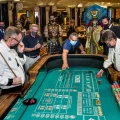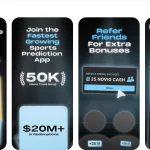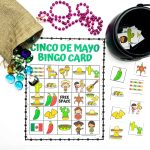
Sand clock sign button on keyboard with soft focus
Let’s be honest—gambling isn’t a one-size-fits-all activity. For some folks, it’s a bit of weekend fun. For others, it can become a serious problem. And certain groups of people are just more vulnerable. They’re playing on a different field, often with hidden obstacles. This isn’t about blame; it’s about awareness and building a better, safer game plan.
So, who falls into these high-risk demographics? We’re talking about young adults, whose brains are still wiring themselves. Individuals with a family history of addiction. People dealing with mental health challenges like depression or anxiety. And honestly, anyone going through a period of high stress or financial strain. Sound familiar? It probably does to a lot of people. The key isn’t to avoid gambling altogether, but to approach it with eyes wide open and a solid set of responsible gambling strategies.
Understanding Your Personal Risk Factors
You can’t build a strong defense if you don’t know what you’re defending against. It’s like preparing for a storm without checking the weather forecast. The first, and maybe most crucial, strategy is ruthless self-honesty.
Ask yourself a few tough questions:
- Do I often think about gambling or get the urge to bet?
- Have I ever tried to cut back and failed?
- Do I sometimes gamble to escape problems or numb uncomfortable feelings?
- Have I ever lied about how much time or money I’ve spent?
Answering “yes” doesn’t mean you have a problem. But it does mean you need to be more vigilant than the average person. It means your early warning system should be set to maximum sensitivity.
Practical, No-Nonsense Strategies for Safer Play
Okay, enough theory. Let’s get into the nitty-gritty. What can you actually do? Here are some powerful, actionable responsible gambling strategies designed specifically for those who might be on shakier ground.
1. Pre-Commit. Like, For Real.
This is the big one. Set a loss limit and a time limit before you even log in or walk into the casino. And I mean before. Not while you’re in the middle of the action, when judgment is clouded by adrenaline and hope.
Treat it like a concert ticket. You pay a set price for a set amount of entertainment. Once the money and time are gone, the show’s over. The key is to see the lost money as the cost of your entertainment, not a potential investment you need to win back.
2. Use the Tools—They’re There for a Reason
Online casinos and betting sites aren’t just being nice. They’re often regulated to provide these features. Use them! They are your best friends.
- Deposit Limits: The single most effective tool. Cap how much you can deposit daily, weekly, or monthly. It’s a hard stop.
- Time-Outs: Feeling a bit shaky? Take a breather. Set a time-out for 24 hours, 7 days, a month… whatever you need to reset.
- Self-Exclusion: This is the nuclear option, and for high-risk individuals, it can be a lifesaver. Programs like GAMSTOP allow you to ban yourself from all licensed sites for a chosen period.
3. Separate Your Finances
Never, ever gamble with money earmarked for essentials: rent, bills, groceries. Here’s a simple trick: have a separate, dedicated account or even a pre-paid card for gambling funds. Once that pot is empty, you’re done. This creates a physical and mental barrier between your life and your play.
4. Avoid the “Chase”
Chasing losses is the fastest route to serious trouble. It’s that feeling of “I’m down $100, I need to win it back.” That mindset turns gambling from recreation into a stressful job where you’re always in debt. If you find yourself thinking this way, that’s your cue to stop immediately. Walk away. The money is gone. Chasing it is just digging a deeper hole.
Building a Support System Around You
This might be the most overlooked strategy. Gambling can be incredibly isolating. Breaking that silence is powerful.
Talk to someone you trust. It doesn’t have to be a big confession. Just let a friend or partner know you’re trying to be more mindful about your habits. Ask them to check in with you. This creates accountability.
And know where to find professional help. Keep these numbers and sites handy, just in case:
| Resource | How It Helps |
| National Council on Problem Gambling (NCPG) | Confidential 24/7 helpline (1-800-522-4700) and chat. |
| Gamblers Anonymous (GA) | Peer-support groups using a 12-step model. |
| GAMSTOP | Free UK service to self-exclude from all online gambling. |
| Gambling Therapy | Provides free practical support and counseling globally. |
It’s About Control, Not Abstinence
For many in high-risk groups, the goal isn’t necessarily to quit forever. It’s to regain a sense of control. It’s about changing the relationship from something that controls you to something you control. It’s the difference between being a passenger and being the driver on a winding road. You’re the one with your hands on the wheel, you know the risks of the route, and you know when it’s time to pull over and stop for the night.
That sense of agency? That’s the real win. It’s worth more than any jackpot.













